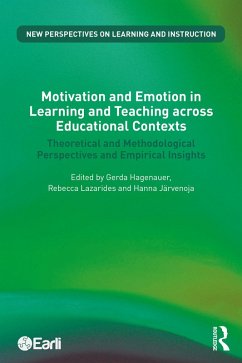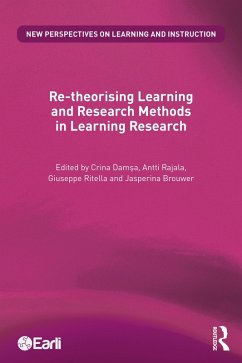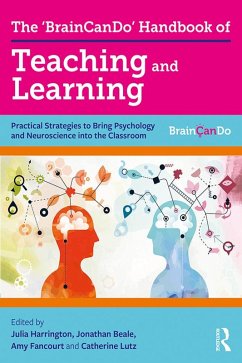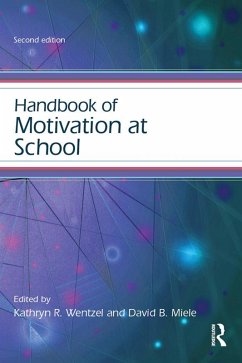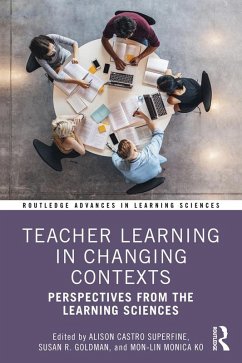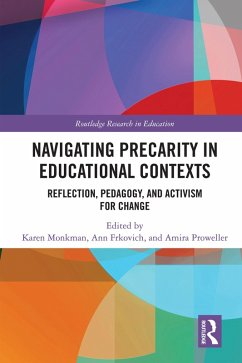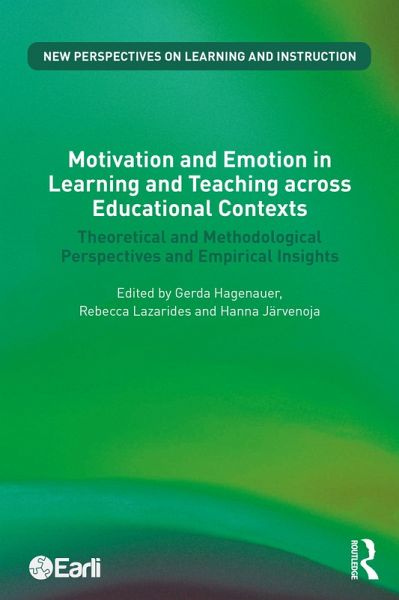
Motivation and Emotion in Learning and Teaching across Educational Contexts (eBook, PDF)
Theoretical and Methodological Perspectives and Empirical Insights
Redaktion: Hagenauer, Gerda; Järvenoja, Hanna; Lazarides, Rebecca
Versandkostenfrei!
Sofort per Download lieferbar
38,95 €
inkl. MwSt.
Weitere Ausgaben:

PAYBACK Punkte
19 °P sammeln!
Motivation and Emotion in Learning and Teaching across Educational Contexts brings together current theoretical and methodological perspectives as well as examples of empirical implementations from leading international researchers focusing on the context specificity and situatedness of their core theories in motivation and emotion.The book is compiled of two main sections. Section I covers theoretical reflections and perspectives on the main theories on emotion and motivation in learning and teaching and their transferability across different educational contexts illustrated with empirical ex...
Motivation and Emotion in Learning and Teaching across Educational Contexts brings together current theoretical and methodological perspectives as well as examples of empirical implementations from leading international researchers focusing on the context specificity and situatedness of their core theories in motivation and emotion.
The book is compiled of two main sections. Section I covers theoretical reflections and perspectives on the main theories on emotion and motivation in learning and teaching and their transferability across different educational contexts illustrated with empirical examples. Section II addresses the methodological reflections and perspectives on the methodology that is needed to address the complexity and context specificity of motivation and emotion. In addition to general reflections and perspectives regarding methodology, concrete empirical examples are provided. All cutting-edge chapters include current empirical studies on emotions and motivation in learning and teaching across different contexts (age groups, domains, countries, etc.) making them applicable and relevant to a wide range of contexts and settings.
This high-quality volume with contributions from leading international experts will be an essential resource for researchers, students and teacher trainers interested in the vital role that motivation and emotions can play in education.
The book is compiled of two main sections. Section I covers theoretical reflections and perspectives on the main theories on emotion and motivation in learning and teaching and their transferability across different educational contexts illustrated with empirical examples. Section II addresses the methodological reflections and perspectives on the methodology that is needed to address the complexity and context specificity of motivation and emotion. In addition to general reflections and perspectives regarding methodology, concrete empirical examples are provided. All cutting-edge chapters include current empirical studies on emotions and motivation in learning and teaching across different contexts (age groups, domains, countries, etc.) making them applicable and relevant to a wide range of contexts and settings.
This high-quality volume with contributions from leading international experts will be an essential resource for researchers, students and teacher trainers interested in the vital role that motivation and emotions can play in education.
Dieser Download kann aus rechtlichen Gründen nur mit Rechnungsadresse in A, B, BG, CY, CZ, D, DK, EW, E, FIN, F, GR, HR, H, IRL, I, LT, L, LR, M, NL, PL, P, R, S, SLO, SK ausgeliefert werden.




